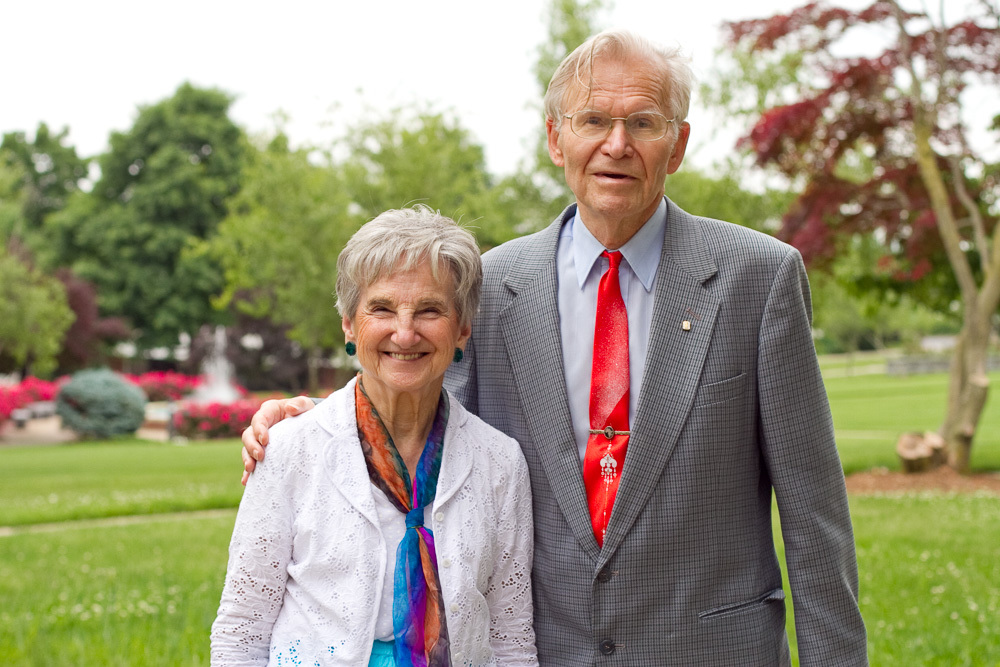At 3 p.m. each day, James and Marian Payne would stop their activity, whatever it might be, and share tea-time together. That time became significant on Saturday, May 12, as Vernon Jantzi, professor emeritus at Eastern Mennonite University, attempted to stay true to the timetable of James Payne’s memorial service.
The hope was to end in time to share tea together outside Martin Chapel — the Payne’s children and grandchildren, from as far away as Texas, with many others who came to Harrisonburg to honor their legacy. But the sharing about the lives of this memorable couple continued several minutes past, before a final reading, in unison, of I Corinthians 13.
Click here to donate to the Payne Family Endowed Scholarship.
“In my life I have tried to walk in the way of love, to practice what I believe, and to be a friend to all. My wish for you is that you might continue to do the same,” James shared in a writing printed in the memorial service program.
James and Marian were founding donors of EMU’s Center for Justice and Peacebuilding. James, a lifelong educator, aided Jantzi in the center’s initial curriculum development.
He died Dec. 21, 2017, in his Richmond home just over four months after losing Marian, his wife of 60 years.
a Peacebuilder magazine article.
The Paynes each chose different places to host their separate memorial services, said daughter Beth Payne. Marian’s was in Richmond, where she and James had made their home after living in Virginia’s Northern Neck and where she volunteered at schools and with community organizations.
James wanted his memorial service to be at EMU, among those whose work he most resonated with and strongly supported. The service acknowledged the gifts of both, who were “cheerful givers, generous givers, and strategic givers,” said CJP Executive Director Daryl Byler.
“It is impossible to speak about James without also speaking of Marian,” Byler said. “They were like couples’ figure skaters whose work flowed together seamlessly and whose individual flare served only to accent the other.”
The Paynes’ financial gifts, totaling $2.7 million, enabled the creation and founding of CJP, but also its continued development. Often their gifts were strategically pointed towards broadening CJP’s influence and sustainability: for example, the Paynes supported the hiring of the center’s first alumni coordinator, Diana Tovar MA ’17, who has helped to create networks among the 638 alumni doing peacebuilding work in 65 countries.

Their gifts also pushed CJP to deepen their roots and plan for an impactful future. They supported Peacebuilder magazine and the sustained work of a dedicated development associate. This role is now held by Lindsay Martin, who helps to direct annual gifts between $350-$450,000 and an endowment that has grown to more than $4.6 million.
Jantzi concluded the service with a message of thanks to the Payne family and a reminder that many people continue to benefit from their “generosity and love” without even knowing it. The Summer Peacebuilding Institute, one of CJP’s longest-running programs, has provided education to 3,100 people from 124 countries since its inception in 1994, and several participants have gone on to create their own similar peacebuilding institutes in 12 countries.
“Here they are encouraging each other, learning from each other, learning about themselves and benefiting from this generosity, as they transform themselves and their environments in which they work,” he said. “It is amazing how those little seeds planted by James and Marian have flourished and grown and continue to impact the world today.”
Teacher, builder, artist
James Payne was born Sept. 2, 1931 to Gladys (Roth) and A. Roy Payne in Pocomoke City, Maryland, but spent the majority of his childhood in Kishacoquillas Valley, Belleville, Pennsylvania.
Payne worked as a milk inspector, builder, minister, missionary, teacher and college professor. He spent two years in Ethiopia as a builder before marriage. After completing his bachelor’s degree in education at Eastern Mennonite College in 1958, he returned to Ethiopia with his pregnant wife and two children to be the administrator at the Emperor’s School for Blind Boys.
He eventually returned to the U.S. to serve as head teacher for an elementary school in Roaring Springs, Pennsylvania, while serving as pastor of the Martinsburg Mennonite Church. After completing a doctorate in elementary education at Pennsylvania State University, Payne then taught for 20 years in the Elementary Education Department at Shippensburg State University.
Outside of his professional interests, Payne built cabins (three of them, all created without power tools), made hand-hooked rugs, gardened, read and wrote.
The couple has five children and nine grandchildren.

I remember Marian well. We were class members for at least one year, but each went our own way for a while. What a wonderful legacy they leave with us.